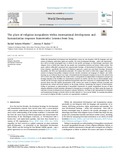| dc.contributor.author | Sabates-Wheeler, Rachel | |
| dc.contributor.author | Barker, Jeremy P. | |
| dc.coverage.spatial | Iraq | en |
| dc.date.accessioned | 2023-10-12T15:22:32Z | |
| dc.date.available | 2023-10-12T15:22:32Z | |
| dc.date.issued | 2023 | |
| dc.identifier.citation | Sabates-Wheeler, R. and Barker, J.P. (2023) 'The Place of Religious Inequalities Within International Development and Humanitarian Response Frameworks: Lessons from Iraq', World Development, Vol 173, DOI: 10.1016/j.worlddev.2023.106417 | en |
| dc.identifier.uri | https://opendocs.ids.ac.uk/opendocs/handle/20.500.12413/18127 | |
| dc.description.abstract | Within the international development and humanitarian arenas no one disagrees with the language and aspirations of inclusion, protection, rights and equality. Yet, most development framings – policy and operational – have still to develop meaningful ways to attend to the specific advantages or disadvantages associated with religious views or beliefs that shape the way people and communities function and behave within society. This paper explores influential conceptual and programmatic framings of international development and humanitarian response, specifically the human development approach, capital and asset-based framings, horizontal inequalities, the SDGs and humanitarian principles. We analyse the extent to which they engage with considerations of religious inequalities (religious diversity, identity, inclusion) and language of ‘religion’ and belief. Drawing on an evidenced-based case study of humanitarian/development responses in Iraq in the period from 2014 to 2019, the paper illustrates the reality of how a smorgasbord of religion-blind development concepts and framings interplay at the frontline of a humanitarian response to conflict, and the ways in which multiple actors wrestle and flex to design, target and implement programmes that were conceived in a religion-blind frame. The research shows how the explicit incorporation of the context and nature of religious diversity dynamics into frameworks has critical real-world impacts on the design, delivery, monitoring and impacts of interventions. Failing to incorporate an understanding of inequalities experienced by people marginalized because of their religious affiliation or belief (whether intentional or through mere oversight) has very likely muted the hoped-for outcomes of many development and emergency response initiatives. Our hope is that international development and humanitarian framings can better deliver on their objective to “leave no one behind” by ensuring inequalities on account of religious identity or practice are appropriately considered. | en |
| dc.language.iso | en | en |
| dc.publisher | Elsevier | en |
| dc.relation.ispartofseries | World Development;173 | |
| dc.rights.uri | http://creativecommons.org/licenses/by/4.0/ | en |
| dc.subject | Aid | en |
| dc.subject | Development Policy | en |
| dc.title | The Place of Religious Inequalities Within International Development and Humanitarian Response Frameworks: Lessons from Iraq | en |
| dc.type | Article | en |
| dc.rights.holder | © 2023 The Authors. Published by Elsevier Ltd. | en |
| dc.identifier.externaluri | https://www.sciencedirect.com/science/article/pii/S0305750X23002358?via%3Dihub | en |
| dc.identifier.doi | 10.1016/j.worlddev.2023.106417 | |
| rioxxterms.funder | Default funder | en |
| rioxxterms.identifier.project | Default project | en |
| rioxxterms.version | VoR | en |
| rioxxterms.versionofrecord | 10.1016/j.worlddev.2023.106417 | en |
| rioxxterms.funder.project | e4b8632d-62dd-4f31-9936-43860ac26f9a | en |


